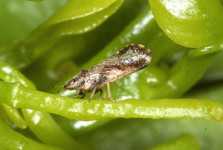Avoid Psyllid Resistance: 2013 Florida Citrus Show Extended Content Coverage

When it comes to crop protection, due diligence is required by growers. Luckily, there are myriad chemistries available that afford the chance to harvest fruits of their labor despite relentless pest and disease pressure. Notwithstanding, citrus growers in Florida have been working overtime to fight the Asian citrus psyllid (ACP). Being the vector of HLB makes it Enemy No. 1 in and around citrus groves. While there are multiple methods in place to address psyllid control, concern is rising over insecticide resistance.
At the 2013 Florida Citrus Show, UF/IFAS entomologist Lukasz Stelinski led a presentation on the potential for insecticide resistance in ACP management and how to avoid it. He pointed out that in 99% of insect control failures, the problem is not related to resistance. He said only about 25 species of major agricultural pests have significant resistance issues. Unfortunately for
citrus growers, there are several biological factors that favor the development of resistance regarding the psyllid, including little or no migration between populations, feeding on one or few plant species available, and short generation time.
According to Stelinski, the current status of ACP resistance in Florida does not appear to be out of control yet. In order to prevent potential problems, continued vigilance and cooperation are needed from growers. He offered several tips on what not to do: cutting rates or skipping rows — especially with low volume ground or aerial sprays; following a ground application of a neonicotinoid with a foliar spray of the same mode of action; and any back-to-back application of the same mode of action. “Any type of rotation is better than none,” he said.









